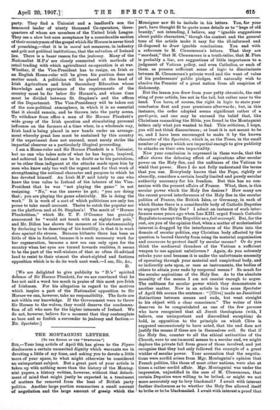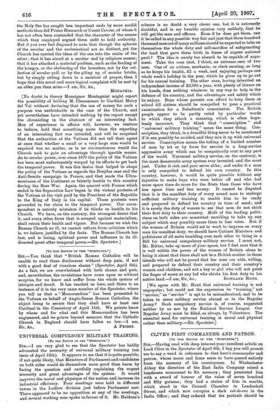THE MONTAGNINI LETTERS.
[TO ms Emma or ram .'srscraroa..] Silt,—Your long article of April 6th has given to the Figaro disclosures a certain unmerited dignity which warrants me in devoting a little of my time, and asking you to devote a little 'More of your space, to what might otherwise be considered an unimportant subject. But a great part of your article is taken up with nothing more than the history of the Montag- mini papers, a history written, however, without that detach- ment of mind that might justly be expected in a treatment of matters far removed from the heat of British party politics. Another large portion summarises a small amount of negotiation and the large amount of gossip which the Monsignor saw fit to include in his letters. You, for your part, have thought fit to quote some details as to "kegs of old brandy," not intending, I believe, any "ignoble suggestions about public characters," though the context and the general tone of the article make it easy for the ill-informed and ill-disposed to draw ignoble conclusions. You end with a reference to M. Clemenceau's letters. That they are "mordant," that M. Clemenceau is a truth-teller, that H. Pion is probably a liar, are suggestions of little importance to a; judgment of Vatican policy, and even Catholics, or such of them as possess sufficient sense of login to discriminate between M. Clemenceau's private word and the want of value of his predecessors' public pledges, will naturally wish to absolve the Premier of a great nation from all suspicion of dishonesty.
But the lesson you draw from your petty chronicle, the real sting of your article, lies not in the tail, but rather near to the head. You have, of course, the right in logic to state yonr conclusion first and your premisses afterwards ; but, in this instance, the order adopted seems significant rather of a parti-pris, and one may be excused the belief that, like Christians ransacking the Bible, you found in the Montagnini letters only what you wanted to find. This criticism, I hope, you will not think discourteous ; at least it is not meant to be so, and I have been encouraged to make it by the known character of the Spectator, which is, as the Times, in the small number of papers which are impartial enough to give publicity to attacks on their own impartiality.
Now your conclusion is expressed in these words, that the affair shows the debasing effect of aspirations after secular power on the Holy See, and the unfitness of the Vatican to wield that power. Here I do not fully understand the terms that you use. Everybody knows that the Pope, rightly or absurdly, considers a certain locally limited and purely secular authority necessary for his freedom. But this has no con- nexion with the present affairs of France. What, then, is this secular power which the Holy See desires P How many are the recent proved interferences of the Holy See in the secular politics of France, the British Isles, or Germany, in each of which States there is a considerable body of Catholic Deputies to support the Holy See P I admit an instance of such inter- ference some years ago when Leo %HI. urged French Catholic Royalists to accept the Republic as a fait accompli. But, for the rest, are you of the opinion that, when a matter of ecclesiastical interest is dragged by the interference of the State into the domain of secular politics, any Christian body affected by the question is barred thereby from using its material organisation and resources to protect itself by secular means ? Or do you think the mediaeval thunders of the Vatican a sufficient weapon to use against unbelievers ? Again, do you solemnly rebuke your soul because it is under the unfortunate necessity of operating through your material and unsphitual body, and so indirectly acts upon, or uses as instruments, the bodies of others to attain your ends by corporeal means ? So much for the secular aspirations of the Holy See. As to the absolute morality of the means I am not casuist enough to argue. The unfitness for secular power which they demonstrate is another matter. Now in an article in this same Spectator of April 6th occurs the sentence "[Clive] made no Jesuitical distinctions between means and ends, but went straight to his object with a clear conscience." The writer of this deserves to be congratulated as one of the few persons who have recognised that all Jesuit theologians (with, I believe, one unimportant and discredited exception) do hold, in opposition to the principle on which Clive is supposed unconsciously to have acted, that the end does not justify the means if these are in themselves evil. So that if the Holy See, counter to all the ethical authorities of the Church, were to use immoral means to a secular end, we might deplore the private fall from grace of those involved, and yet recognise that they had only followed the exaMple of a great wielder of secular power. Your accusation that the negotia- tions were sordid arises from Mgr. Montsguini's opinion that French politico, like those of most other nations, were also at times a rather sordid affair. Mgr. Montagnini was under the impression, unjustified in the case of M. Clemenceau, that certain Deputies were willing to be bribed, or might we not more accurately say to levy blackmail ? I await with interest further disclosures as to whether the Holy See allowed itself to bribe or to be blackmailed. I await with interest a proof that
the Holy See has sought less important ends by more sordid methods than did Prince Bismarck or Count Cavour, of whom it has not often been contended that the character of the means which they employed argued them unfit to hold authority. But if you ever feel disposed to note that though the spheres of the secular and the ecclesiastical are so distinct, yet the Church has carried the ideas of the one into the realm of the other ; that it has aimed at a secular end by religious means; that it has attacked a material problem, such as the feeding of the hungry, or the sheltering of the homeless, not by the col- lection of secular pelf, or by the piling up of secular bricks, but by simply sitting down to a carnival of prayer, then I hope that this novel and more logical complaint will be met by an abler pen than mine.—I am, Sir, lee.,
MONACHIA.
[No doubt in theory Monsignor Montagnini might report the possibility of bribing M. Clemenceau to Cardinal Merry del Val without declaring that the use of money for such a purpose was unthinkable in the case of the Church, and yet nevertheless have intended nothing by the report except the chronicling in the abstract of an interesting fact. Men of experience in affairs will, however, we venture to believe, hold that something more than the reporting of an interesting fact was intended, and will be surprised that the authorities at the Vatican did not tell their agent at once that whether a small or a very large sum would be required was no matter, as in no circumstances would the Church seek to gain an advantage through ignoble means. As to secular power, ever since 1870 the policy of the Vatican has been most unfortunately warped by its efforts to get back the temporal power. It was this desire that helped to shape the policy of the Vatican as regards the Dreyfus case and the Anti-Semite campaign in France, and that made the Ultra- montanes of the Continent so bitterly hostile to this country during the Boer War. Again, the quarrel with Prance which ended in the Separation Law began in the violent protests of the Vatican at the visit paid by the President of the Republic to the King of Italy in his capital. Those protests were grounded in the claim to the temporal power. Our corre- spondent is entirely mistaken if he thinks us hostile to his Church. We have, on the contrary, the strongest desire that it, and every other force that is arrayed against materialism, shall retain their health and vigour. But because we wish the Roman Church no ill, we cannot refrain from criticism which is, we believe, justified by the facts. The Roman Church has lost, and is losing, spiritual power and influence in its ill- directed quest after temporal power.—En. Spectator.]











































 Previous page
Previous page